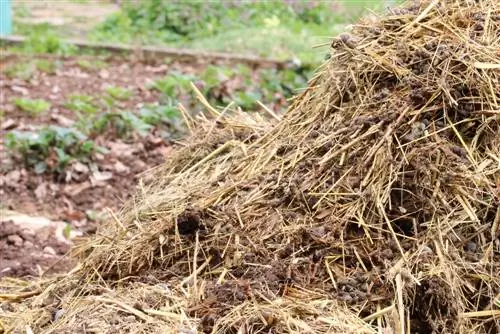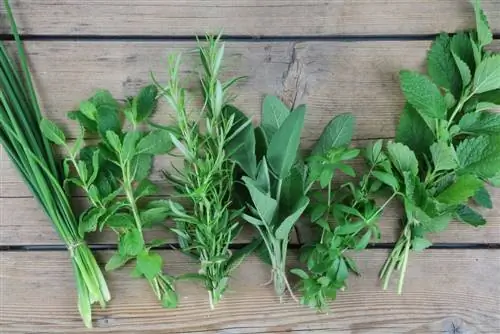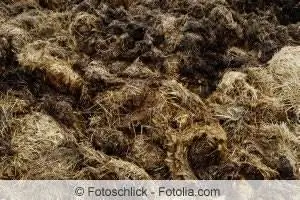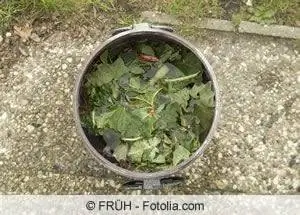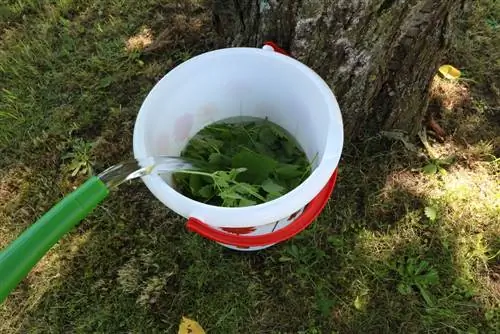- Author admin caroline@plants-knowledge.com.
- Public 2023-12-17 03:39.
- Last modified 2025-06-01 06:48.
Experts assume up to 15 million tons of horse manure per year in Germany. The amount of cow dung produced annually is even higher. The daily output per cow is between 15 and 20 kilograms.
Not all crap is the same
Depending on the type of husbandry, bedding, feeding, storage and manure, the composition and nutrient content of animal excretory products varies. The different digestive systems of horses and cattle, which are ruminants, also produce different manure. Horse manure is characterized by a high nitrogen content. It contains many undigested plant components such as seeds and is mixed with litter and straw.
The mineral ratio of cattle manure is more balanced than horse manure. It contains a lot of potassium. However, if it comes from stables with factory farming, it may contain residues of medication or other chemicals.
Where to put the crap?
- Both horse and cow manure are suitable for use in the garden.
- However, the hobby gardener should never apply the fertilizer fresh, but rather compost it first.
Mineral fertilizers dissolve in water. In contrast, organic fertilizers first need to be decomposed by the microorganisms in the soil. Although this process is lengthy, it also reduces the risk of over-fertilization. During storage, e.g. B. in a dung pit, the strawy parts decay. When the straw components and manure on the compost can no longer be distinguished, it is well settled and ready for spreading.
- Fresh cow dung is not only too harsh for plants, but it also produces a lot of heat when it decomposes.
- The heat generated by horse manure is particularly high. This makes it the ideal fertilizer for cold frames.
It lies over the bed like a warm blanket. So that it can develop its warming effect, horse manure should be stored in an airy place in winter. This delays the rotting process and thus the release of heat. The natural heating based on horse manure only starts when it is spread on the cold frames. However, too much heat can destroy the roots of the plants.
Which fertilizer for which plant?
If you want to grow cabbage, tomatoes or cucumbers in the cold frame, you should choose the “hot” horse manure. The heat from its decomposition supports plant growth. Likewise, radishes, lettuce and spinach and even strawberries grow well with horse manure. As with the cold frame plants, the gardener is better off using stored horse manure or manure than a fresh horse manure and straw mixture. Rose and orchid growers also appreciate horse manure. The nutrients in horse manure fuel the growth and blooming power of flowers. In addition to the minerals, the manure supplies the plants with fungi, bacteria and hormones.
Cattle manure is an all-purpose fertilizer and can be used anywhere. It is well absorbed by almost all soils and plants. Its effect is long-lasting and does not stop after a few weeks like horse manure. Cow dung binds loose sandy soil and loosens clay soil. It has a cooling effect on marl and limestone soils.
Since soil and plants need different nutrients, many gardeners mix several types of manure. If, in addition to the heat supply, a high proportion of potassium and nitrogen is important, then horse manure can be easily mixed with the manure from sheep, goats and rabbits. The addition of poultry manure increases the proportion of phosphorus and trace elements.
Use horse manure and cow dung correctly
When spreading animal fertilizer in your home garden, pay attention to the following:
- Use only seasoned, composted animal manure.
- Always work the manure into the soil on beds. On the one hand, undermining reduces the odor nuisance.
- However, from a gardener's point of view, it is much more important that the microorganisms in the soil have better access to the manure.
- If you decide to store it on the ground, layer a 5 cm thick layer of manure on the bed.
- Never cover shoots and leaves with manure!
- Do not add fertilizer directly into the planting hole. This is especially true for trees and perennials.
- Change the manure in cold frames every spring.
The trade now offers animal dung in dried form. The storage and handling of these pellets is very simple and is described in detail on the packaging.
Opinions differ when it comes to optimal fertilization - whether before winter or in spring. The main reason for applying the fertilizer before winter is its frost-protecting effect. It can also constantly release nutrients into the soil over the winter months. The soil is then optimally prepared at the start of the growth phase. The argument against this is that the nutrients in the manure - which are actually important for the growth phase - are washed out by snow and rain over the winter. In addition, the warming effect is usually limited to a few weeks.
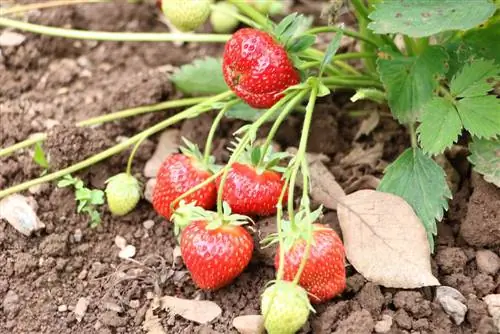
Anyone who wants to spread their manure over large areas on fields or pastures cannot do so as they see fit, as they would in their own garden, but must comply with the fertilizer regulations. It determines which nutrient quantities are permitted per hectare.
The regulations on placing fertilizers on the market are binding for farmers who want to sell their excess farmyard manure. From the type of fertilizer to the net weight and the composition to the origin and date, the seller must label the manure in detail and have it recorded on a delivery note.
Natural benefits for the garden
Animal fertilizer is a renewable raw material. It naturally supplies the soil with nutrients and organic substances. Over-fertilization or damage to the soil and plants is hardly possible when spreading cow manure and horse manure. On the contrary: organic fertilizers maintain and improve soil fertility.
Recycling the stable manure in the garden or in the field is effective and inexpensive. It also reduces the waste problem. Admittedly, composting and applying fertilizer is time- and labor-intensive. If you are afraid of this effort, you can use industrially produced dry pellets. They also have less odor.
What you should know about horse and cow manure in brief
- Horse manure is the excrement of horses mixed with straw. Cow dung is the name given to the excrement of cattle.
- If the weather is humid, the cow dung decomposes over a period of about two to three months.
- Cow dung provides a habitat for numerous insects. Over-fertilization occurs around such cow dung.
- The result is that the grass grows particularly lush in the places where the cows have left their excrement in the pasture.
- If the weather is dry, cow dung can also dry out. These can then be used as fuel, for example.
Cow dung still has considerable economic importance today in numerous high mountain regions in India, Turkey and Tibet, but also in various regions of the Alps, and is used dried as heating material.
Many people, especially organic gardeners, are looking for alternative fertilization methods, so-called organic fertilizers. This also includes horse manure and cow dung. Horse manure is relatively easy to obtain, as agriculture and horse farms usually produce huge amounts of horse manure over the course of a year. The amount of manure produced in agriculture over the course of a year - caused by horses, pigs and cows - can sometimes become a problem because not all of the manure produced can be used by the farmers themselves for fertilization, although horse manure and cow manure are used Fertilizer is widely used in agriculture.
In addition, many small and hobby gardeners are now happy to take advantage of what some farmers have to offer and help themselves to the manure heaps around the corner. According to experts, horse manure is the best manure that can be used for fertilization, although fresh horse manure still has very high ammonia content, in contrast to horse manure that has already partially rotted.

